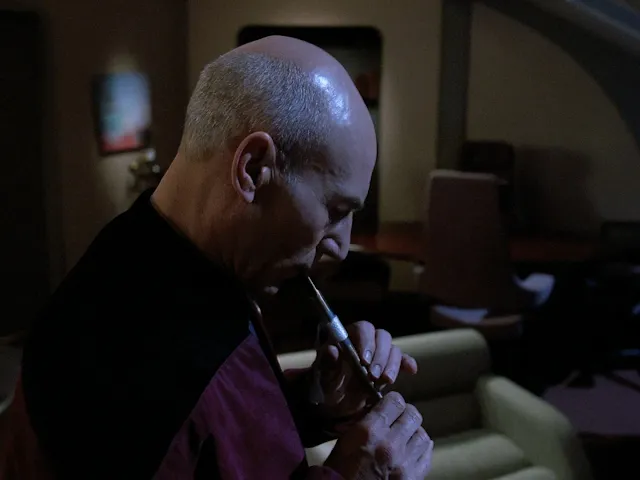A Life Lived in an Instant: An Analysis of TNG's "The Inner Light"
Star Trek: The Next Generation's __"Inner Light"__ episode is a masterclass in storytelling that takes us on a journey through time and space. This episode is an exceptional blend of science fiction and drama that showcases the creative brilliance of the series, earning writer Morgan Gendel a Hugo Award for his work.
Directed by Peter Lauritson, the episode was inspired by a book called The Martian Chronicles by Ray Bradbury, which explores similar themes of memory, identity, and legacy. The show's creator, Gene Roddenberry, had a vision for a series that would explore the human condition and tackle important social issues, and this episode certainly lives up to that legacy.

An Enduring Masterpiece
The Plot: A Lifetime in Minutes
The plot of "The Inner Light" is a shining example of the kind of storytelling that made The Next Generation such a beloved show. The Enterprise crew encounters an alien probe that sends a mental projection into Captain Picard's mind, causing him to experience an _entire lifetime_ on a distant, doomed planet named Kataan.
He raises a family, becomes a respected member of the community, and learns to play the Ressikan flute. The story is both heart-wrenching and life-affirming, and it's a testament to the show's ability to blend science fiction with philosophical and emotional themes.
Patrick Stewart's Iconic Performance
The episode stars Patrick Stewart as Captain Jean-Luc Picard, who becomes the central character in this story. Stewart delivers a stunning performance, perhaps his most iconic effort as Picard. His portrayal of a man who experiences a lifetime's worth of memories in a matter of minutes is nothing short of exceptional.
He initially resists the probe's effects, but as he is drawn deeper into the experience, he begins to accept his new life. He experiences a full range of emotions, from confusion and disorientation to the joy and deep love for his wife and children on Kataan.
Central Themes: Memory and Identity
One of the main themes of "The Inner Light" is the importance of memory and the legacy that we leave behind. The entire purpose of the Kataan probe was to find someone who could become a living memory of their lost civilization, ensuring they would not be forgotten. It's a poignant reminder to cherish our experiences and the people we meet.
Additionally, the episode explores the concept of identity and how it can change over time. Picard, the dedicated Starfleet captain, becomes Kamin, a family man and community member. The experience profoundly affects him, adding layers of depth to his character that resonate throughout the rest of the series.
Director's Log & Trivia
- The Hugo Award: "The Inner Light" won the 1993 Hugo Award for Best Dramatic Presentation, making it one of only a handful of television episodes to achieve such an honor.
- The Ressikan Flute: The iconic melody Picard learns was composed by Jay Chattaway. The flute prop itself has become one of Star Trek's most famous artifacts. After the episode, the flute would occasionally appear in Picard's ready room and was featured prominently in a follow-up episode, "Lessons," where Picard shares a duet with a romantic partner.
- A Lasting Legacy: Picard's experiences as Kamin are referenced several times in later media, including the film *Star Trek: Insurrection* and the series *Star Trek: Picard*, highlighting the profound and lasting impact the event had on his life.
Enduring Legacy and Critical Acclaim
"The Inner Light" is widely regarded as one of the best Star Trek episodes of all time, and for good reason. It paved the way for other science fiction shows to delve deeper into character development and emotional storytelling. Upon its initial airing, it was a hit with both viewers and critics for its emotional depth and poignant narrative.
Despite being over 30 years old, "The Inner Light" remains just as relevant today. Its legacy is seen in its influence on later episodes of Star Trek and its broader cultural impact. It goes toe-to-toe with other classics like "Yesterday's Enterprise" and "The Measure of a Man" as a fan and critical favorite.















